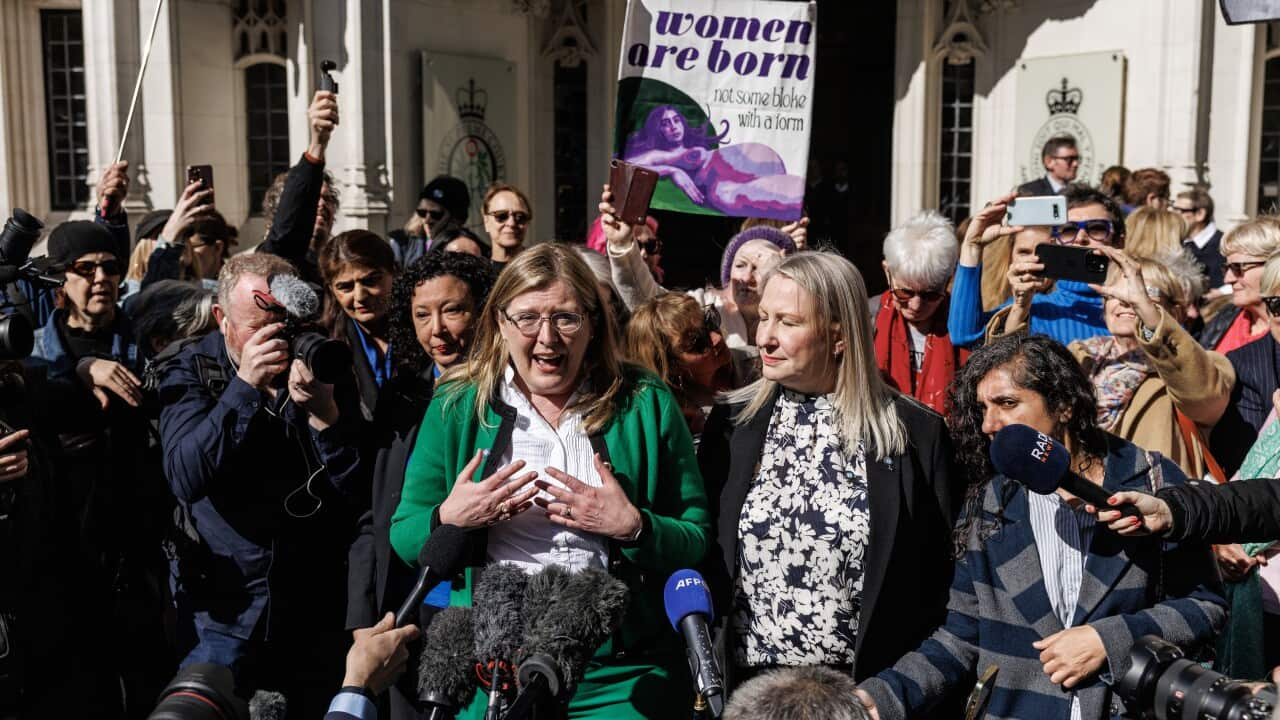The United Kingdom's Supreme Court has ruled the legal definition of a 'woman' is based on a person's sex at birth.
Five judges unanimously ruled on Wednesday "the terms 'woman' and 'sex' in the Equality Act 2010 refer to a biological woman, and biological sex".
The court's pronouncement follows a legal battle between the Scottish government and campaign group For Women Scotland involving clashing interpretations of the Equality Act.
While the Scottish government argued that the law gave trans women with a Gender Recognition Certificate (GRC) the same protections as a biological female, the campaign group disagreed.
After the court's decision, public bodies will now have to review their policies.
The British Transport Police has already made a move, saying on Thursday (local time) that it had changed its strip search policy, and trans people held in custody would be searched by an officer in line with their birth sex.
How will it impact women-only spaces?
Single-sex spaces and services, including changing rooms, "will function properly only if sex is interpreted as biological sex", the judgment said.
Kishwer Falkner, chair of the Equality and Human Rights Commission, which is responsible for enforcing the Equality Act, told BBC Radio the law was now clear.
"If a service provider says 'we're offering a women's toilet', then trans people should not be using that single-sex facility," she said.
But Falkner highlighted there was no law forcing organisations to provide single-sex spaces and no law preventing them from providing unisex toilets or changing rooms.
She said trans rights organisations should push for more neutral third spaces to accommodate trans people.
Will trans women still have access to female-only hospital wards?
Current guidance from the body that runs the state-funded National Health Service (NHS) in England states trans people should be "accommodated according to their presentation: the way they dress, and the name and pronouns they currently use".
The advice has meant trans women have been allowed to opt for treatment in women-only hospital wards even if they do not have a GRC or have not legally changed their name.
The certificate is a UK legal document that recognises an individual's gender identity, allowing them to legally change their sex.
"The NHS is currently reviewing guidance on same sex accommodation," an NHS England spokesperson told AFP.
Falkner said the watchdog would pursue the NHS if it did not change the existing guidance on the treatment of trans women patients.
What's the future for trans women in sport?
The court decision is a victory for prominent voices in the debate, such as swimmer Sharron Davies, who won an Olympic silver medal at the Moscow Olympics in 1980.
It was time for sports bodies to "protect every female athlete", she said after the ruling.
Campaigners said there were now "no excuses" for allowing transgender women to compete in women's sporting events.
Fiona McAnena, director of campaigns at the charity Sex Matters, said the law had in fact always been "clear that everyone male can be excluded to provide fair, safe sport for women and girls, but some people claimed it was unkind or complicated to do so".
Falkner said the ruling made it "simple" that people assigned male at birth cannot take part in women's sport.
Sebastian Coe, president of World Athletics, told Sky News he welcomed the ruling "because it has produced clarity".
"It is really important that we continue to protect the integrity of women's competition," he said.
Former Football Association (FA) chair David Triesman told the Daily Telegraph rulemakers who allowed trans women to compete alongside biological women should "stand down immediately".
Will gender recognition certificates be abolished?
The usefulness of GRC would be re-assessed in light of the ruling, Falkner said.
Asked if she thought the documents were now "worthless", she said she believed they were "quite important" but that future litigation was likely to provide clarity on their "efficacy".
"It's going to be a space that we'll have to watch very carefully as we go on.
"There will be other areas ... the government is thinking of digital IDs, and if digital IDs come in, then what documentation will provide the identity of that person?"
Visit the to access articles, podcasts and videos from SBS News, NITV and our teams covering more than 60 languages.




